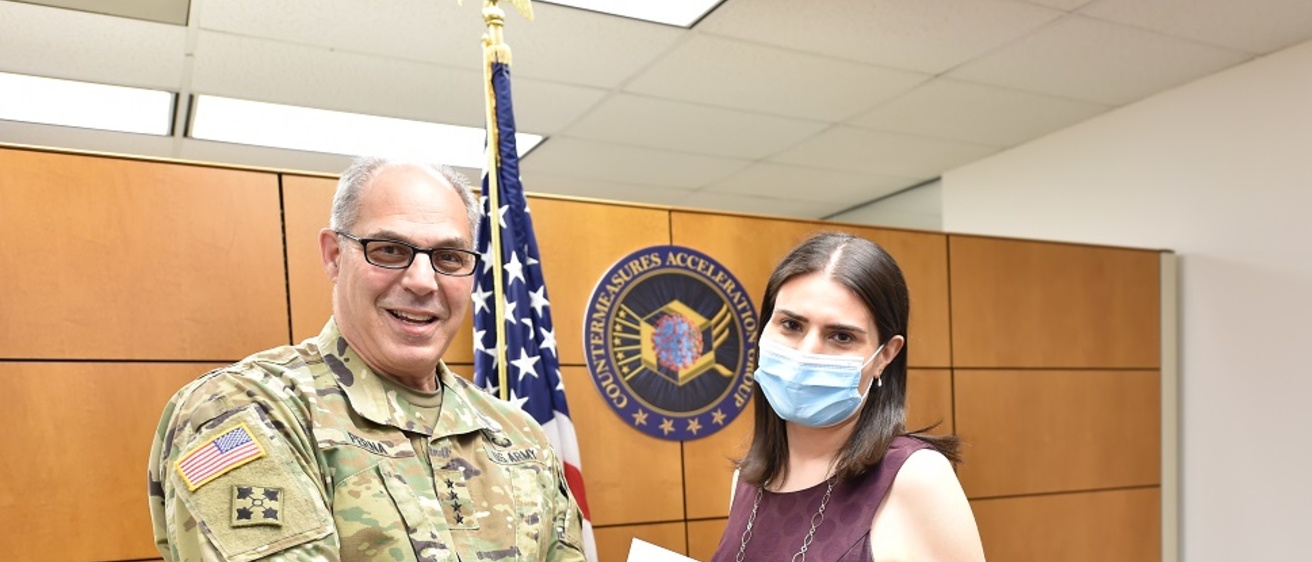In her role as Director of CEO Operations at U.S. Pharmacopeia (USP), Farah Towfic, '11 PharmD, led the development of handling guidelines for frontline healthcare workers tasked with vaccinating Americans against Covid-19.
USP’s Covid-19 Vaccine Handling Toolkit played a significant role in the success of the nation's Operation Warp Speed vaccination effort. Recently, Towfic was recognized by General Gustave F. Perna, Chief Operating Officer of the Office of Operation Warp Speed, for her role in creating the toolkit.
Towfic received a challenge coin from the general and his personal thanks, as well as a tour of the national Vaccine Command Center at U.S. Department of Health and Human Services headquarters in Washington, DC. She says the meeting with Perna was an honor she didn't expect but one she's proud to have experienced.
"General Perna recognized the role USP played in building confidence in quality and consistency of the vaccine rollout," says Towfic, a native of Dubuque, Iowa, who has worked at USP for nearly three years.
USP is a nonprofit scientific organization that develops standards for the use of medical products. It published an 11-page toolkit on how to store, handle and transport the Covid-19 vaccines early in the vaccination effort, reflecting the work of the Healthcare Safety and Quality Expert Committee. The toolkit provides information for all approved vaccines, for pre-drawing and labeling syringes, and offers advice on how to minimize vaccine waste and maximize doses per vial.
Towfic was interviewed by Pharmacy Times, and Reuters, about USP's role in the early days of the vaccine rollout. Towfic, who holds an MBA from the University of Wisconsin, says that she and her colleagues realized early on that Operation Warp Speed would only be successful if vaccine administrators understood exactly how to handle vaccines and maximize doses, with a focus on mass vaccination sites, especially since the three vaccines approved for distribution in the U.S. have different protocols.
"We have about 200 million doses of flu vaccine that are put into the U.S. marketplace every year, and we know the majority of those are distributed to [and] administered by pharmacists and other health care providers, and they do a great job,” says Towfic. “However, what's unique about the pandemic is the unprecedented scale and speed with which we're trying to get vaccines in arms. It was imperative to make sure resources were maximized--human resources and medical resources."
A big part of Towfic's work was listening to nurses, doctors, and pharmacists to understand their needs and translate them into the USP's vaccine toolkit. Before she started her career at USP, Towfic spent time in community pharmacies, and she says the experience helped her understand specific challenges. She also relied on feedback from her classmates.
"I cannot understate how important the Iowa network was in the success of creating the toolkit," says Towfic. "I am not in a practicing pharmacist role right now, so I called upon classmates and colleagues and asked them what service gaps they were noticing in the vaccine rollout. Learning from them was a big help, and it gave me confidence that we were addressing the right pressure points."
The toolkit has been updated since it was first released in January, and has been in every state and territory in the U.S., with an international version in development.
"It was an honor to be a part of this work and to see it come to fruition," says Towfic. "I'm proud of where the U.S. is in terms of vaccinating citizens, the work of my pharmacist colleagues, and I'm proud that USP could be helpful in this effort."
